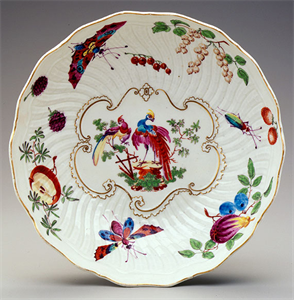
Worcester Porcelain Factory
English, born established 1751
English, born established 1751
Teabowl
about 1776
Object Type:
Ceramic
Creation Place:
Northern Europe, English, Worcestershire
Dimensions:
1 5/8 in. x Diam: 3 in. (4.13 cm x 7.62 cm)
Medium and Support:
Porcelain
Accession Number:
1991.0018.0001.0001
Credit Line:
Gift of Mr. and Mrs. James Lucien Loeb
Currently On View
Keywords
Click a term to view the records with the same keyword
Additional Images
Click an image to view a larger version
Related Objects
Click a record to view

Saucer
1991.0018.0001.0002
Portfolio List
Click a portfolio name to view all the objects in that portfolio
This object is a member of the following portfolios:
Your current search criteria is: Keyword is "W" and [Object]Century is "Eighteenth century" and [Object]Display Artist is "Worcester Porcelain Factory" and [Object]Nationality is "English".

